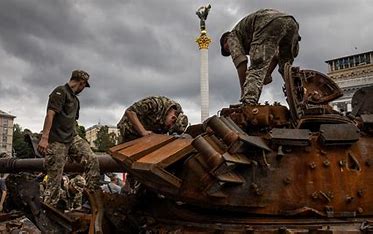Even after three years, significant developments in the Russia-Ukraine war continue to shape geopolitical history. Lately, Ukraine has pressed drone attacks deep into Russia, targeting logistics and military infrastructure, indicating that Kyiv is pushing for strategic advantage. Meanwhile, the winter offensive of Russia faces the issues of logistical bottlenecks and sagging morale in troops as Wagner Group affiliates are reportedly strained. Diplomatic efforts, including those by China and the UN, seek de-escalation, but with limited progress as both sides gain a decisive turn in the conflict.
Background recap
The Russia-Ukraine war, which started in February 2022, has been the most significant conflict in Europe since World War II. The tensions leading to this war had roots that were centuries old but intensified when Russia launched a full-scale invasion, citing NATO expansion and the protection of Russian-speaking populations as justifications. Ukraine, supported by its Western allies, resisted very hard, and the war has been long and very devastating. The conflict has resulted in severe humanitarian crises, displacing millions and causing vast damage to infrastructure. Diplomatic efforts have failed time and again as both nations are bent on securing territorial and political advantages.
Escalation in conflict
In late 2023 and early 2024, the Russia-Ukraine war entered a new phase-the substantial escalations. Significant losses notwithstanding, Ukraine succeeded in the counteroffensive in the east, attaining military gains. Expanded drone warfare focused on underground infrastructure in Russia. Early winter 2024 saw Moscow face major logistical problems it could not overcome to enhance its military momentum in the newly launched winter offensive. Both sides were intransigent in their diplomatic negotiations, which went nowhere. The internationalization was also deepened by NATO’s enhanced military support to Ukraine, especially in terms of long-range missile systems. There was also an intensification of humanitarian distress during this period, since the conflict had spread beyond traditional battlefields, affecting civilian populations and critical infrastructure deeply.
Responses from around the world
The war has brought a polarized international response. Ukraine has received military aid, economic sanctions against Russia, and humanitarian assistance for displaced civilians from NATO and EU countries. Meanwhile, countries like China and India have encouraged diplomatic resolutions, thus avoiding alignment. Russia has been economically isolated by global sanctions, which have also put pressure on energy markets globally. The protracted violence has hindered the diplomatic efforts of the United Nations and regional actors.
Impact on Global Politics
The war has reshaped geopolitics of the world. NATO’s expansion to the east with Sweden and Finland joining, indicates that West is stronger against Russian action. The energy markets still remain volatile, as the Europe continues to diversify away from Russian oil and gas. The fight has further strengthened China’s position as a conciliator, and kept international institutions such as UN under strain. The drawn-out war underscores the emerging new power dynamics in post-Cold War era.
Humanitarian crisis
The humanitarian crisis from the conflict is quite telling, with more than 15 million Ukrainians internally and externally displaced, with millions as refugees in neighbouring countries in Poland. Destruction of infrastructure, lack of discrimination in bombardments, and harsh winters account for the increasing number of civilian casualties, worsening life conditions. The discomfort of the victimized people is heightened by the difficulties faced by humanitarian organizations in delivering assistance amidst continued hostilities and blocked corridors.
Economic Ramifications
The war has seriously impacted global supply networks, particularly for gasoline, fertilizer, and food. Ukraine’s blockade of Black Sea ports has led to food shortages in developing countries. Russia continues to export energy to non-Western partners but is severely economically isolated as a result of sanctions. The conflict is one of the major factors that explain the current global financial trends since economies around the world have been affected by inflation, economic instability, and shifting trade patterns.
Who is at Fault in the Russia-Ukraine War?
In all fairness, responsibility for this complicated Russia-Ukraine conflict is shared on both sides. Most concur that the primary aggression was when Russia invaded Ukraine in 2022 and violated its sovereignty. Yet, those long-standing geopolitical issues include among other things, such as Russia’s security worries and the expansion of NATO, that have worsened the war. Although the world condemned the actions of Russia as illegal, the larger geopolitical environment did play a role in this escalation, which included unsuccessful diplomatic attempts. Ultimately, a solution requires addressing the core problems from both sides, which involve security, sovereignty, and diplomacy.
Diplomatic Approaches to Ending Conflict
A complex strategy that encompasses diplomatic talks and international engagement is required to address the conflict between Russia and Ukraine. Respecting Ukraine’s sovereignty and territorial integrity, diplomatic channels should prioritize ceasefires and the defense of civilian infrastructure. Involving impartial mediators might help bridge the gap between the disputing parties and encourage effective communication.
It requires a balanced approach that incorporates both the security interests of Russia and territorial integrity of Ukraine in ending the war. Since Russia views NATO’s growth as a threat, diplomacy efforts should focus on that with the consideration of the independence of Ukraine. The role of international organizations, like the UN, NATO, and the EU, must be key in building communication, instilling confidence, and establishing long-term security for both sides. A strong, amicable agreement can be achieved that addresses justifiable concerns of both Russia and Ukraine in order to offer stability for the larger European space.
Dr. Alisha Verma is an Assistant Professor Law at Symbiosis Law School, Pune.









